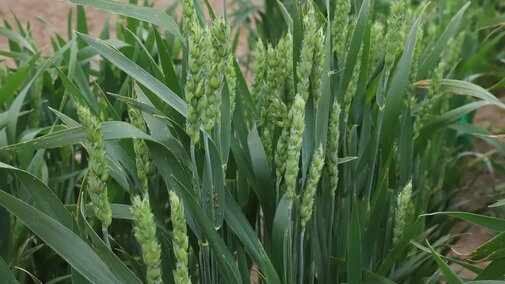The collaborative USDA-University of Nebraska Small Grains Improvement Team has developed two promising new winter wheat varieties: a hard white winter wheat (NW13493) and a hard red winter wheat (Epoch). Both new varieties could be available for planting in growers’ fields as early as fall 2021.
NW13493 was released primarily for its high-value white grain and broad adaptation to rainfed conventional and organic wheat production systems throughout Nebraska. NW13493 is sprouting- resistant and has a good disease resistance package and excellent milling and baking quality. NW13493 has been licensed to Bay State Milling Company and will be produced under contract with their agents. This critical partnership will maintain the necessary marketplace segregation for hard white winter wheat and protects growers.
Epoch, a hard red winter wheat tested as NE15420, is ideally suited for irrigated production and intensive management in western Nebraska, where it has excelled for grain yield and test weight in the Nebraska State Variety Trial. Epoch is a short stature, semi-dwarf line with excellent straw strength to reduce lodging under irrigation. It has a good disease resistance package with acceptable milling and baking quality.
“These new-to-the-market wheat varieties have exceptional higher yield and stronger disease resistance package,” said Hector Santiago, assistant dean of the University of Nebraska-Lincoln’s Agricultural Research Division. “These varieties represent a major achievement of the University of Nebraska Small Grains Breeding Program that without doubt will positively impact wheat production in Nebraska, as they were developed to suit stakeholders growing areas and conditions in Nebraska and the Midwest.”
Stephen Baenziger, a UNL wheat breeder who retired last month after 35 years with the University of Nebraska-Lincoln, was instrumental in the development of these varieties. During Baenziger’s tenure, he has released, co-released or is in the process of releasing 44 winter wheat, seven winter barley and 13 winter triticale cultivars. Katherine Frels was recently hired to be the new small grains breeder and continue the tradition of producing new varieties.
Both the NW13493 and Epoch varieties were developed with support from the Nebraska Wheat Board. The Husker Genetics Foundation Seed Program will maintain breeder and foundation seed of NW13493 and Epoch, and the Nebraska Wheat Board has requested a license to assist with the marketing of this variety. See your local Certified Seed Dealer for variety characteristics and more information on these varieties.
NW13493 Characteristics
NW13493 was derived from the cross “SD98W175-1”/“NW03666” made in 2007.
NW13493 has performed extremely well across Nebraska in head-to-head comparisons for grain yield with the current popular wheat varieties. It outyields comparable varieties such as Ruth, Freeman and LCS Valiant. NW13493 has high test weight equivalent to wheats such as Ruth and Siege but is significantly higher than Overland, LCS Valiant, Robidoux, Settler CL, Freeman and Wesley.
NW13493 has excellent milling and baking quality.
NW13493 is a white wheat that retained high falling numbers under conditions that could trigger preharvest sprouting, suggesting it is not highly susceptible to preharvest sprouting. NW13493 is moderately late in maturity (143 days after Jan. 1), similar to Ruth, one day later than Freeman and two days later than LCS Valiant.
NW13493 is a semi-dwarf wheat variety that comparable to or shorter than Ruth, Robidoux and Overland; NW13493 is taller than Freeman, LCS Valiant, Siege, Settler CL and Wesley. NW13493 has moderate straw strength for a semi-dwarf wheat with little lodging reported in the years it has been tested.
The winter hardiness of NW13493 is good and comparable to other winter wheat varieties grown in Nebraska.
It is resistant to soilborne wheat mosaic virus, moderately resistant to stem and leaf rust and rated moderately resistant/moderately susceptible to stripe rust. NW13493 is moderately resistant to Fusarium head blight (syn. scab) but was rated susceptible to Hessian fly and wheat streak mosaic virus.
Epoch Characteristics
Epoch (tested as NE15420) is a hard red winter wheat selected from the cross of “Hitch”/“NW03666” made in 2009.
Epoch was selected for release due to its exceptional performance under irrigation. In the last three years, Epoch has been tested in the Nebraska Irrigated State Variety Trials where it was the second highest yielding line and not significantly different from WBB418 (highest yielding line) and WB-Grainfield, Long Branch, AM Eastwood and CP7869.
Epoch is significantly higher yielding than Wesley (a very popular bronze chaff irrigated wheat variety known for its strong straw).
Epoch performed acceptably in the rainfed trials, however, LCS Valiant, Ruth, Siege and Robidoux outperformed it. Epoch is not recommended for rainfed production based on these results. Epoch’s test weight and grain protein was good under irrigation like the best currently recommended irrigated varieties for test weight and grain protein.
Epoch has acceptable milling and baking quality.
It is a bright chaff, short statured semi-dwarf wheat variety that is slightly shorter than Wesley, with very good straw strength (i.e. lodging resistant) under irrigation.
The winter hardiness of Epoch is good and comparable to other winter wheat varieties grown in Nebraska.
Epoch is resistant to soilborne wheat mosaic virus and stem rust, moderately resistant to stripe rust, and moderately susceptible to leaf rust. Epoch is moderately susceptible to Fusarium head blight (syn. scab), susceptible to Hessian fly, and based on genomic data, it is expected to be susceptible to wheat streak mosaic virus.

